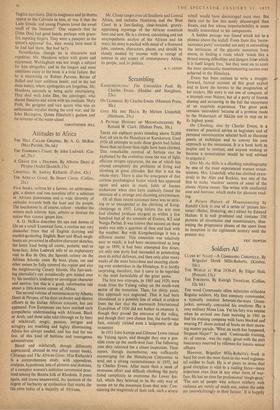Attitudes to Africa
FIVE books, written by a farmer, an anthropolo- gist, a doctor and two novelists offer a selection of African panoramas and a wide diversity of attitudes towards both the land and the people. The touchstone is, of course, colour : whether the writers each tolerate hate, admire or distrust the native they cannot ignore him.
A. G. McRae describes the ups and downs of life on a small Transvaal farm, a routine not very dissimilar from that of English dairying and market-gardening. English, Boer and Black neigh- bours are presented in effective character sketches, the latter kind being all comic, pathetic and/or bone-lazy. John Lodwick tells of an exploratory visit to Rio de Oro, the Spanish colony on the African Atlantic coast. By boat, plane, car and other means he fully covered the region and also the neighbouring Canary Islands. His fact-seek- ing journalist's eye occasionally gets misted over by his novelist's tendency to investigate character and motive, but this is a good, informative tale about a little-known corner of Africa.
The second volume of reminiscences by Alberto Denti di Pirajno, of his days as doctor and district officers in the Italian African colonies, has just appeared. Few Europeans can have reached such sympathetic understanding with Africans, Black or Arab, and these tales told (through or by him) of witchcraft, magic, passion, intrigue and savagery are touching and highly illuminating. Africa has always needed, and has had far too few, of this kind of humane and courageous administrator.
Blood and witchcraft, though differently appreciated, abound in two other recent books, Chisungu and The African Giant. Miss R ichards's is a comprehensive study, with appendices. analyses, hypotheses, lots of pictures and sketches, of a complex women's initiation ceremonial prac- tised among the Bemba folk of Rhodesia. It poses- again, and leaves unanswered, the question of the degree of barbarity or civilisation that marks the life even today of a majority of Africans.
Mr. Cloete ranges over all Southern and Central Africa, and includes Monrovia and the West Coast in a fact-finding, clear-headed, grimly- appraising reportage of the African condition here and now. He is a shrewd, calculating and not unsympathetic analyst of the African and his ways; his story is packed with detail of a thousand jobs, customs, characters, places, and should be closely studied by anyone with a vestige of interest in any aspect of contemporary Africa, its people, and its politics.
A. V. COTON


































 Previous page
Previous page